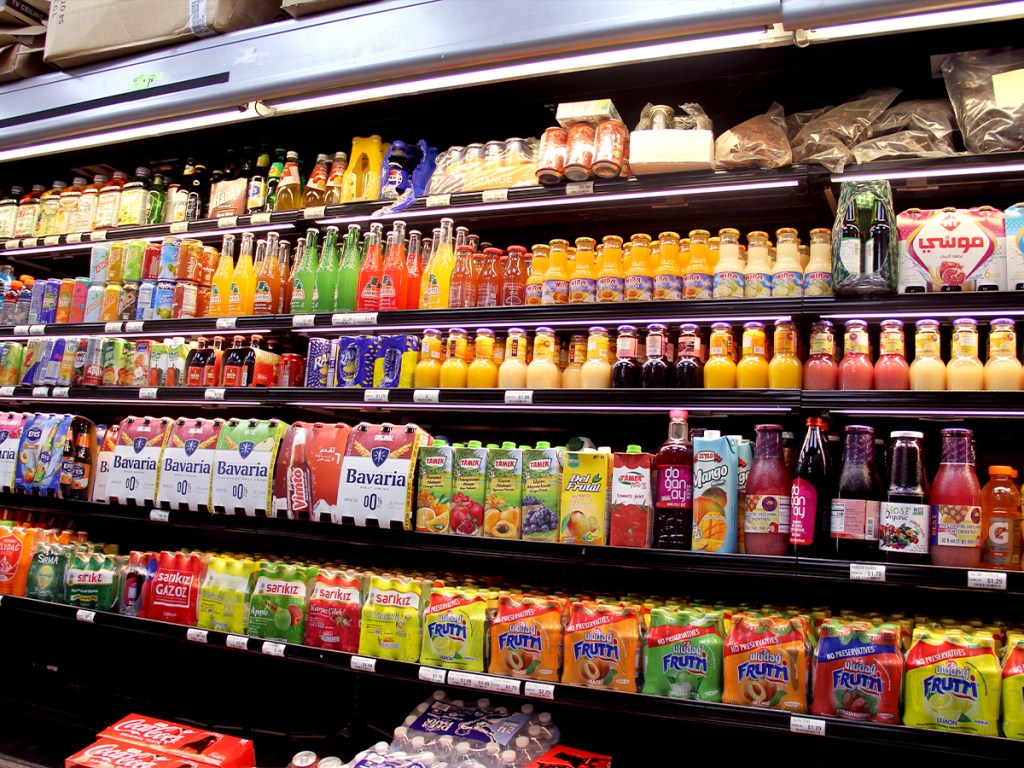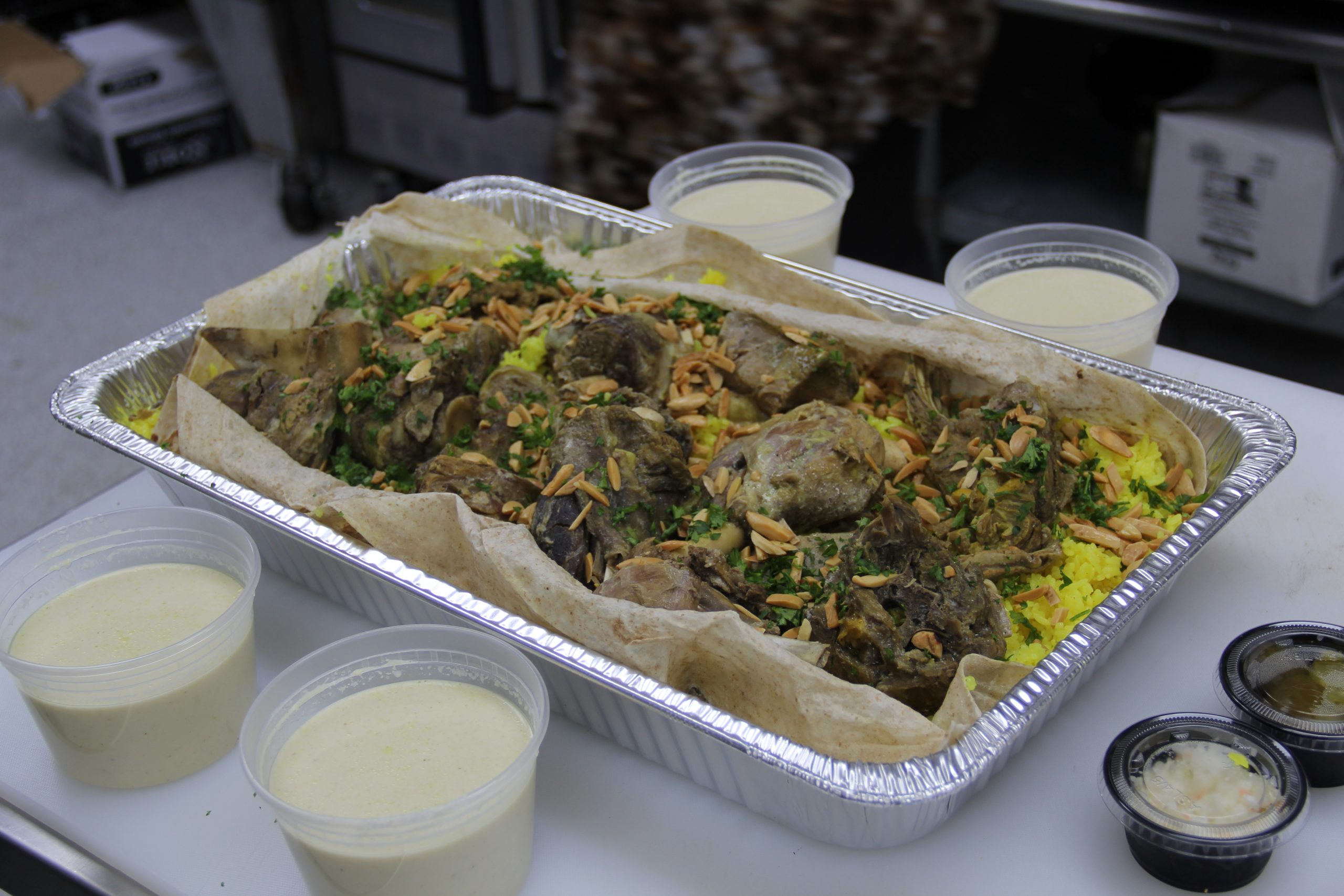There’s so much to see inside Global Suq, a Palestinian-owned market and grill on a corner of South Roxboro Street in Durham, that I briefly forget I’m supposed to be getting lunch and begin doing some grocery shopping. I pick up a jar of pomegranate molasses and contemplate whether I need a five-pound bag of halal peach rings before remembering my mission.
The shop is bustling on this Friday afternoon. I snagged the last spot in the parking lot. Most customers are speaking Arabic, greeting each other with “Salam alaikum” as they navigate aisles stocked with lentils, Moroccan sardines, dates, rosewater, bulgur, and hundreds of other pantry items.
Along one wall, there’s specialty produce like sour plums, Persian cucumbers, fresh green almonds, and quince. Another wall is lined with freezers containing Turkish bagels, kofta, minced mulukhiyah, and fillo dough. In a densely packed corner, at least 50 different spices fill bags and jars. Near the register, there are desserts—baklava, knafeh, ma’amoul, ten varieties of Turkish delight. A deli counter in the back displays different cuts of halal beef, chicken, lamb, and goat, as well as cured meats like soujouk and beef mortadella.
The smell of charred meat draws me deeper into the market. I track the aroma to its source: a cone-shaped rotisserie loaded with chicken, turning slowly in a kitchen area behind the deli counter.
Global Suq has been around since 2022, but didn’t have a restaurant component until early last month. The menu keeps things simple: chicken shawarma wraps and bowls ($9 and $11), single and double burgers ($6 and $8), roasted half and whole chickens ($10 and $18).
There’s a tempting $13 shawarma wrap combo that comes with fries, coleslaw, and mixed pickles, but with tax and tip, I’d be over budget. I decide to get the wrap on its own and pick something from the market to complement it.
A colorful selection of drinks catches my eye. I grab a can with Arabic script and a clump of raisins pictured on the label.
My total comes to $12 even. Next to the register, where a tip jar might normally sit, there’s a donation box for an organization providing humanitarian relief for children in Gaza. In lieu of a tip, I fold three dollar bills and push them through the slot.
A few minutes later, someone brings me a white plastic grocery bag. I claim the sole indoor table (a few more tables sit outside on the sidewalk) and dig in.
The wrap, cocooned in foil, is long and slender like a cigar. I’m expecting fluffy pita, but this is a thin flatbread that’s been griddled until parts of it have gone crispy and brown. Inside, shaved chicken glitters with warm spices—I taste cardamom and allspice, but there’s certainly more in the blend. There’s also a smear of something like aioli, and shards of pickle that make my gums tingle.

I initially thought the wrap seemed a bit scant, but it turns out to be endless. Every time I think I’m nearing the finish, there are another few inches to go.
Its savory intensity pairs well with my drink, which is sweet and grapey like dessert wine.
When I finally surface from my meal, I have some questions. Why is this chicken so good? What kind of pickles are these? I start approaching people who look authoritative and asking if they’re the owner. After two failed attempts, I spot a man fielding an inquiry from a customer who just wandered in. When the two of them are done talking, I approach him, as he’s unfolding a second indoor table, and ask if he’s the owner.
“Just a regular,” he says. He sits down and starts eating an order of fries.
I’m about to give up when I see a man sorting receipts by the front door.
“Are you the owner? I’ve been looking for the owner.”
He points at me and frowns. “I think you’re the owner, and I’m looking for you,” he says. Then he starts laughing. “And I think you didn’t pay my salary last month.”
A woman standing nearby rolls her eyes.
“He is a partial owner,” she tells me. So is she, it turns out. Her name is Rasha, and she has the answers I’m seeking.
The pickles in the wrap are Iranian-style pickled cucumbers, known for their tanginess and crunch. The aioli-type spread is toum, a Lebanese garlic sauce. The chicken gets its depth from “special spices imported from Jordan,” and from the rotisserie—“that’s the whole secret, how it turns,” she says.
I’m carrying a camera for the photos that accompany this column. Rasha notices it hanging from my shoulder and asks if I’d be willing to take some photos of their Friday special, mansaf, a lamb and rice dish. In exchange, she’ll give me a container to try.
I follow her back to the kitchen area, where she gestures to an aluminum tray that looks like it was prepared for a feast. She explains this is the Jordanian version of the dish, slightly different from the Palestinian version.

“In Palestine, we use only yogurt” for the sauce that accompanies the dish, she says. “But in Jordan, they use yogurt and jameed—yogurt that’s been dried over time.”
She shows me two chalky white jameed spheres that will be reconstituted into sauce.
“It makes it very rich, very heavy. Once you try it, you get hooked.”
After I snap some photos, Rasha packs me up a container, scattering slivered almonds on top of the lamb like sprinkles on ice cream. The jameed sauce, in a separate container, smells almost like the powdered cheese packet inside a box of mac ‘n cheese, but tastes sharp and funky.
I pour it over the delicate saffron-hued rice and take a bite with the lamb, which slides off the bone like a cloak slipping from shoulders. Hidden at the bottom of the container is paper-thin shrak bread that soaks up the sauce and meat juices. The dish is indeed rich—I take a few bites and save the rest for later.
On my way out, I buy a jar of the Iranian pickles that come on the shawarma wrap. The jokester co-owner rings me up, maintaining the bit: “Just bring me the salary when you can,” he says. “Next week is fine.”
Follow Staff Writer Lena Geller on Bluesky or email [email protected]. Comment on this story at [email protected].
